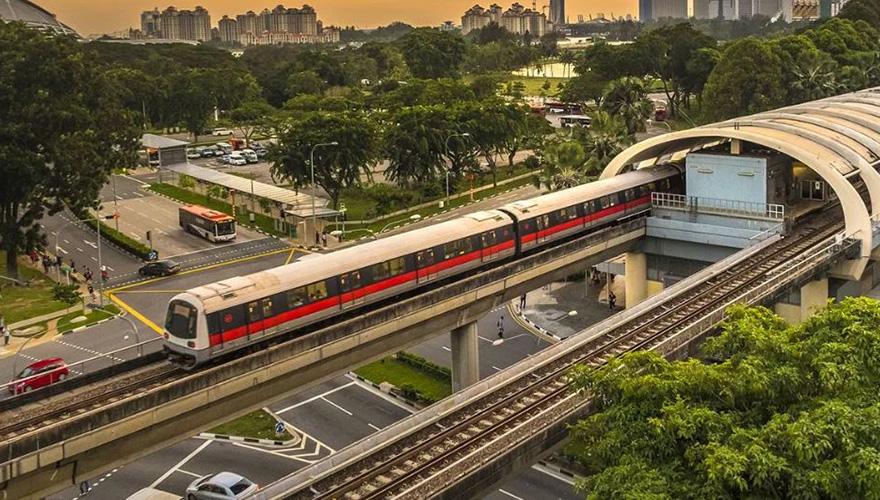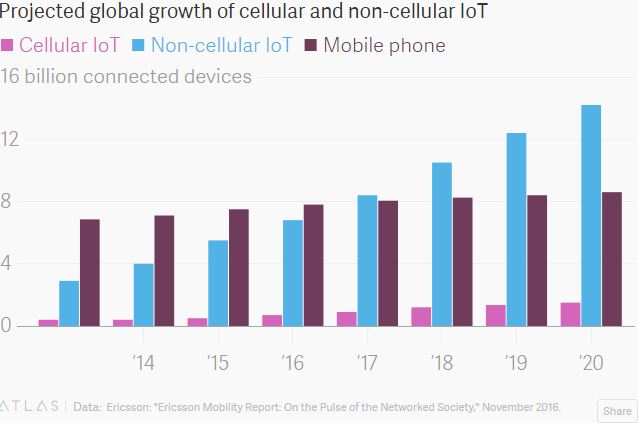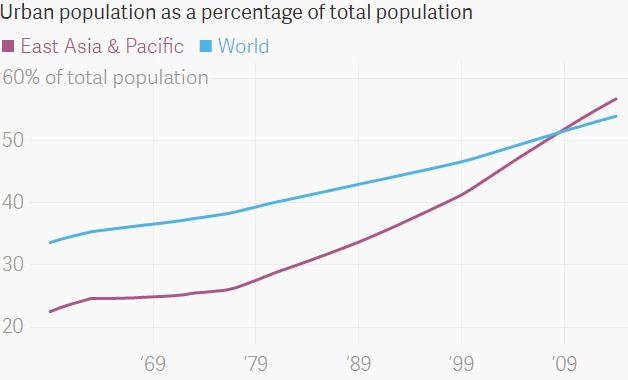
The smart city concept has leapfrogged theory to reality, as a growing number of global business capitals and trade hubs have bought in. This new cocktail of next-gen infrastructure, dense urbanization,
and commercial clout offers the tantalizing possibility of a smart economy.
It might sound like utopian science fiction, but at its core, it's basically the use of tools, policies, and tech to improve economic efficiency. And as different cities and their stakeholders begin to implement their own smart city plans, we are seeing
a number of interpretations emerge.
One increasingly popular idea for the smart economy is to tap the huge amounts of data a smart city generates to power business-oriented analytics. This data might originate from a mix of private and public infrastructuresay subway trains and car share
services, 4G and wifi networks, or even garbage bin sensors and ATMs. Put together, this information can power a responsive public transport network that anticipates crowd surges, or help schedule how sea cargo is shipped to shop shelves without disrupting demand.

San Diego put some of these tools to use with its connected street lamp network. The project started out as a way to slash millions of dollars in annual spending from the city budget with power-efficient LEDs. But the addition of cheap IoT sensors to these fixtures has introduced other economic savings: optimized parking and traffic controls, air quality
and Co2 monitoring, and responsive emergency service deployment.
Networked governance means that everyone contributes to coming up with new and innovative solutions.
For some cities, the idea of handing the government reins to yet another economic lever may seem misguided or a recipe for waste. But the instinct to frame the role of government as one of regulation, bureaucracy, and red-tape is misplaced, according
to Cheryl Chung, a Deputy Director at the Lee Kuan Yew School of Public Policy. Government can play both a protective role by managing the risks that arise from emergent technology, and a facilitative role too by encouraging the growth of industry,
says Chung.
In Chung's view, a balance of tensions between private enterprise and government will result in efficient and inclusive development of smart economic systems: Networked governance means that everyone contributes to coming up with new and innovative solutions.
The state can provide tools and create platforms for experimentation, which opens up space to allow other stakeholders to take a little initiative.
Singapore's early foray into autonomous vehicle adoption is a good example of this idea in action. The government has helped the city get ahead by greenlighting private sector and academic trials,
crafting
supportive legislation, and building up the IoT infrastructure needed foredge device driverless tech.
For other cities, a smart economy means adopting supportive policy measures to grow next generation jobs and industries. In practice, this translates into funding and tax incentives to attract promising start-ups,
venture capitalists, accelerators, and coworking spaces. The idea is to seed an ecosystem that might one day grow into a reliable economic engine in its own right.
While many smart cities have struggled with romantic quests to replicate the magic of Silicon Valley, tangible results can be seen in specialist hubs like Shenzhen's hardware hub, and FinTech clusters in London and Hong Kong. Emerging data tools can support
these new economic ecosystems by helping policymakers analyze and refine their regulatory and commercial strategies at a more immediate pace and granular scale.
What will this look like at the human level?
The need to prepare workers for an automated future with flexible employment is increasingly important as traditional career norms erode, argues Prof. Reuben Ng from the Lee Kuan Yew School of Public Policy. A smart city creates many more paths for people
to participate in the economy, says Prof. Ng. Stay-at-home parents can take part on their own terms and turf, while older professionals can transition to part-time work as a form of step-down retirement.
Some of tomorrow's jobs will certainly include smart city urban planning and data management. And for early adopter cities like New York and Singapore, new smart city investments and talent development will hopefully translate into faster growth in the
future.
One key role for governments is to create a marketplace where problem owners, data custodians and service providers can co-innovate on solutions that impact both Main Street and Wall Street, recommends Prof. Ng. Importantly, by sharing data, governments
can crowd-source insights to solve problems.

That means the keys to the smart city won't be limited to technocrats. Again, partnerships with private industry, tech giants, and nimble start-ups
will help ensure the best ideas are proposed and tested. This is particularly pressing as global urbanization gathers pace (China alone expects 60% of its population will live in urban centers by 2020)building a smart economy has never been more important.
Collecting and analyzing data should of course be just one of many tools in the smart city arsenal. To be truly successful, data analytics must be built on a foundation of both science and art. Relying solely on data-optimized solutions at the expense
of human reasoning and understanding is already proving inefficient. Cities that successfully crowd source the best data, ideas, and talent will be touchstones for those designing the economies of
tomorrow.
This piece was produced in partnership with Quartz.